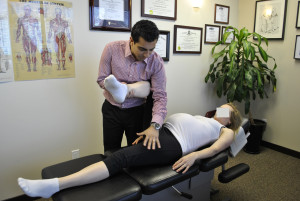
You might experience severe sacroiliac (SII) joint pain as an extremely stabbing, sharp pain which radiates from both your hips and pelvic region, all the way down to your thighs and down to your calves. At times it can feel as if your legs might buckle or numb or sometimes numbness in your lower back as well. It is usually caused by a misalignment of the spine. When this happens the spine's structures aren't properly aligned, resulting in pressure on your sciatic nerves. Many times this occurs because of an injury to one of these joints.
About 80% of people will experience joint pain in the lumbar joint at some point in their adult lives. It is not uncommon for you to experience pain even after you have recovered from surgery. Some of the common causes are spinal stenosis (an abnormal narrowing of the spinal canal), a herniated disc (a condition in which fluid collects inside or around a disc, often due to injury), spondylolisthesis (a condition in which a vertebra slides forward, usually into a fall or sprain), osteoarthritis (arthritis that damages the spine), or tumors of the spine. As with most types of chronic pain, there is no cure. However, there are many treatment options available to help relieve pain and reduce its severity.
Joint supplements are commonly used to treat iliac joint pain. These are supplements designed specifically to treat specific joint problems. Examples of these supplements are glucosamine, chondroitin, MSM, glutathione, and bioperine sulfate. These supplements are designed to improve cartilage tissue, reduce inflammation, increase blood and oxygen flow to damaged cartilage, accelerate bone healing, reduce swelling, reduce muscle spasms, and help the body absorb nutrients. They can also help reduce muscle stiffness.
Anti-inflammatory drugs are commonly used to treat pain in the iliac joint. Examples of these drugs include ibuprofen, naproxen, celebrex, and naproxen sodium.
Joint supplements can help relieve pain and promote healing by reducing inflammation in affected joints. They can do this in two ways. First, they can strengthen the cartilage in the joints by increasing the amount of cartilage produced. Second, they can protect cartilage from wear and tear by reducing the formation of scar tissue.
If your iliac joint pain is severe and persistent, it is highly recommended that you talk to your doctor before starting any joint supplements. Be aware that these supplements can cause side effects in some people, including nausea, dizziness, drowsiness, or dizziness.

There are other forms of treatment for SI joint pain such as physical therapy and massage
Physical therapy can help strengthen your back and hip muscles, allowing them to function more effectively.
Massage is another type of treatment for SI joint pain, which can reduce inflammation and stiffness. It is also a form of treatment for the low back.
Another alternative form of treatment for SI joint pain is exercise. Many times an exercise routine can strengthen the muscles of the back. It can also help to relieve stress, which is often a factor in causing or worsening joint pain.
Chiropractic care is another alternative to treat joint pain. There are chiropractors who specialize in treating SI joint pain.
If you have tried all the above mentioned remedies and still suffer from the SI joint pain, there are other alternative treatments for you to consider. One of the most common natural methods of treatment for this type of joint pain is acupuncture. Acupuncture is a form of alternative therapy that has been around for thousands of years.
Acupuncture is a non-surgical technique that uses pressure to treat various health problems. This form of treatment uses needles to numb the skin and stimulate the body's natural healing process.
Leave a Reply